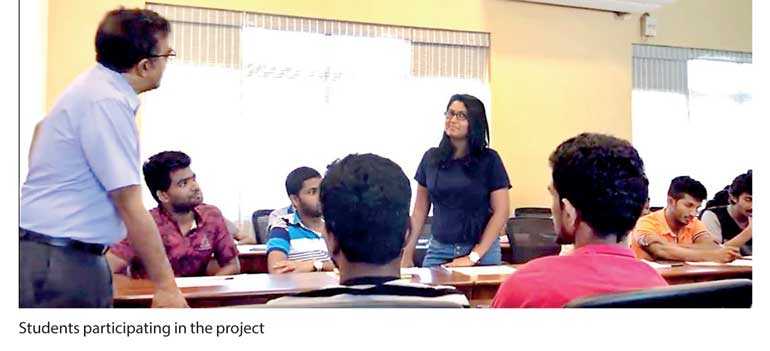Wednesday Feb 25, 2026
Wednesday Feb 25, 2026
Wednesday, 4 July 2018 00:00 - - {{hitsCtrl.values.hits}}
 The United States-Sri Lanka Fulbright Commission has initiated a unique project where a group of students at University of Sri Jayewardenepura and three IT organisations involve in a collaborative problem solving exercise. The problem solving is done with the help of virtual media, during the course of their academic program. The project extends the typical university-industry introduction by allowing a chance for the industry to see the problem solving capabilities of students and the students an opportunity to get exposed to real life industry problems.
The United States-Sri Lanka Fulbright Commission has initiated a unique project where a group of students at University of Sri Jayewardenepura and three IT organisations involve in a collaborative problem solving exercise. The problem solving is done with the help of virtual media, during the course of their academic program. The project extends the typical university-industry introduction by allowing a chance for the industry to see the problem solving capabilities of students and the students an opportunity to get exposed to real life industry problems.
United States Fulbright Specialist and University of Wisconsin Professor of Mathematics Kirthi Premadasa is coordinating this project with Dr. Ravindra De Silva of University of Sri Jayawardenapura. Three leading software organisations, IFS international, Creative Software, and CodeGen International are currently participating in this unique project. Several Faculty members of the Department of Computer Science of University of Sri Jayewardenepura are enthusiastically collaborating in this project. Ananda Dehisgaspitiya, Dr. TGI Fernando, and Dr. Ravindra De Silva are offering the first set of courses for the project. This innovative project was created under the inspiring patronage of Vice-Chancellor, Professor Sampath Amaratunge and Professor Sudantha Liyanage, the Dean of the Faculty.The project is offered in two different forms to benefit the special degree students and the general degree students. As a part of this project, Computer Science Special Degree Students at the university will get a chance to conduct “live” problem solving sessions with industry professionals as part of their coursework. Industry professionals, with the support of the professor in charge of the course will design a collection of problems, which they will collaboratively solve with the students using a collaborative platform such as Twitter or Slack. The initial courses that will be part in the project include Artificial Intelligence, Human Computer Interaction and Machine Learning.
Thanks to virtual communication platforms such as Twitter and Slack, professors now have the opportunity to overcome the constraint of time that they face in the classroom in problem solving assignments given to students and provide students the opportunity to solve problems outside the class time, collaboratively over a period.
Professor Premadasa has done significant research on instructional technology and was chosen by the World Learning section of the US State Department as a Fulbright Specialist to conduct this project. His significant classroom experience in Sri Lanka as well as in the United will contribute to the success of this project.
Through this method, the industry will get an opportunity to present good problems that will enhance the technical and problem solving ability in students, creating a mutually beneficial outcome. The successful participation of this project will be a requirement for the student grades in the courses.
The project offering to the general degree student has connections to the “flipped classroom” model, which is popular in the United States and world over. Each participating company will first present a short video of a concept, which they would like students to study at home. Once students watch the video and familiarise themselves with the concept, the company will then invite the students to a “field trip” to the company, where they will participate in a problem solving session based on the video with industry professionals. This “field trip” will also provide one of the first exposures to the students of an industry-working environment.
Research Assistants Udaka Manawadu and Kavindu Madushanka, who serve as the student coordinators for the project feel that students at the University of Sri Jayewardenepura have enthusiastically endorsed the project and appreciates its usefulness for the student body for years to come. 41 students in the third year are currently participating in the project. The project is currently progressing according to plan and a formal inauguration ceremony will take place at 10 a.m. on Thursday 5 July at the Faculty of Applied Sciences.